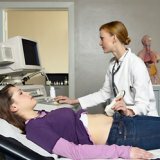Antibiotics for inflammation of the appendages

Adnexitis or salpingo - an inflammation of the ovaries and fallopian tubes, which form the uterine appendages. The disease can be one or two-sided and is very frequent among all inflammatory diseases of the organs of the female reproductive system. The cause of inflammation of appendages is often the infection is in the form of streptococci, enterococci, staphylococci, gonococci, fungi, viruses, Mycobacterium tuberculosis, Escherichia, Chlamydia and other organisms.
In rare cases, adnexitis is caused by microbial associations, for example, E. coli and staphylococcus. Usually, the causative agents of adnexitis demonstrate resistance to antibiotics. However, antibiotics for inflammation of the appendages are appointed in any case, since their reception is part of a comprehensive therapy.
Salpingo-oophoritis in acute stage is treated in the hospital, where mental and physical rest for the patient is created. The patient is assigned easily digestible food, recommended drinks( mors, tea, alkaline mineral water) are recommended. Specialists examine the functions of the organs of the excretory system and the intestine. The use of antibiotics in the treatment of adnexitis is indispensable. When inflammation of the appendages, antibiotic is chosen by the doctor depending on the causative agent of the infection and its antibiotic sensitivity. The dose of the drug is calculated with the account that in the center of inflammation its concentration was maximal. In this regard, in the treatment of inflammation of the appendages use antibiotics with a long half-life. Thus, for example, amoxicillin has a half life of 8 hours, bacampicillin and ampicillin -. 5 hours in case of severe clinical course of the disease and higher risk of its generality, as well as co-infection with Gram-positive and Gram-negative bacteria during infection anaerobic microflora treatment should be conducted rate ofVarious antibiotics. For example, combinations of clindamycin and chloramphenicol, gentamicin and levomycetin, lincomycin and clindamycin are possible. If
inflammation appendages caused by microbial associations( Enterobacteriaceae, Streptococcus, Staphylococcus) and anaerobic bacteria( peptokokki, bacteroides, peptostreptokokki), treatment should begin with the application of penicillin and aminoglycosides are assigned parallel type kanamycin or gentamicin. If within 72 hours the clinical effect of the drugs does not occur, then clindamycin is added to the therapy. It is taken until the temperature subsides and the signs of irritation of the peritoneum disappear. Then, for 5 days, oral administration of penicillin and aminoglycosides is prescribed.
When infected with anaerobic flora, the treatment is performed with metronidazole. The drug has a bactericidal effect against B. fragilis and obligate anaerobes. In especially severe cases, metronidazole is administered intravenously for 5-8 days;In medium-heavy cases - orally for 7-8 days.
the presence of obvious signs of intoxication carried infusion therapy, which is administered parenterally poliglyukina, 5% glucose solution, gemodeza, reopoliglyukina, protein preparations. The total amount of liquid per day should be 2-2.5 liters. If necessary, the infusion medium may be included vitamins means correcting the acid-base equilibrium, for example, 5% sodium bicarbonate solution. Possible use of antihistamines( suprastin, diphenhydramine).



